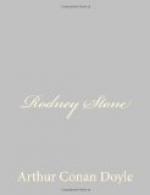It was an age of heroism and of folly. On the one hand soldiers, sailors, and statesmen of the quality of Pitt, Nelson, and afterwards Wellington, had been forced to the front by the imminent menace of Buonaparte. We were great in arms, and were soon also to be great in literature, for Scott and Byron were in their day the strongest forces in Europe. On the other hand, a touch of madness, real or assumed, was a passport through doors which were closed to wisdom and to virtue. The man who could enter a drawing-room walking upon his hands, the man who had filed his teeth that he might whistle like a coachman, the man who always spoke his thoughts aloud and so kept his guests in a quiver of apprehension, these were the people who found it easy to come to the front in London society. Nor could the heroism and the folly be kept apart, for there were few who could quite escape the contagion of the times. In an age when the Premier was a heavy drinker, the Leader of the Opposition a libertine, and the Prince of Wales a combination of the two, it was hard to know where to look for a man whose private and public characters were equally lofty. At the same time, with all its faults it was a strong age, and you will be fortunate if in your time the country produces five such names as Pitt, Fox, Scott, Nelson, and Wellington.
It was in Watier’s that night, seated by my uncle on one of the red velvet settees at the side of the room, that I had pointed out to me some of those singular characters whose fame and eccentricities are even now not wholly forgotten in the world. The long, many-pillared room, with its mirrors and chandeliers, was crowded with full-blooded, loud-voiced men-about-town, all in the same dark evening dress with white silk stockings, cambric shirt-fronts, and little, flat chapeau-bras under their arms.
“The acid-faced old gentleman with the thin legs is the Marquis of Queensberry,” said my uncle. “His chaise was driven nineteen miles in an hour in a match against the Count Taafe, and he sent a message fifty miles in thirty minutes by throwing it from hand to hand in a cricket-ball. The man he is talking to is Sir Charles Bunbury, of the Jockey Club, who had the Prince warned off the Heath at Newmarket on account of the in-and-out riding of Sam Chifney, his jockey. There’s Captain Barclay going up to them now. He knows more about training than any man alive, and he has walked ninety miles in twenty-one hours. You have only to look at his calves to see that Nature built him for it. There’s another walker there, the man with a flowered vest standing near the fireplace. That is Buck Whalley, who walked to Jerusalem in a long blue coat, top-boots, and buckskins.”




